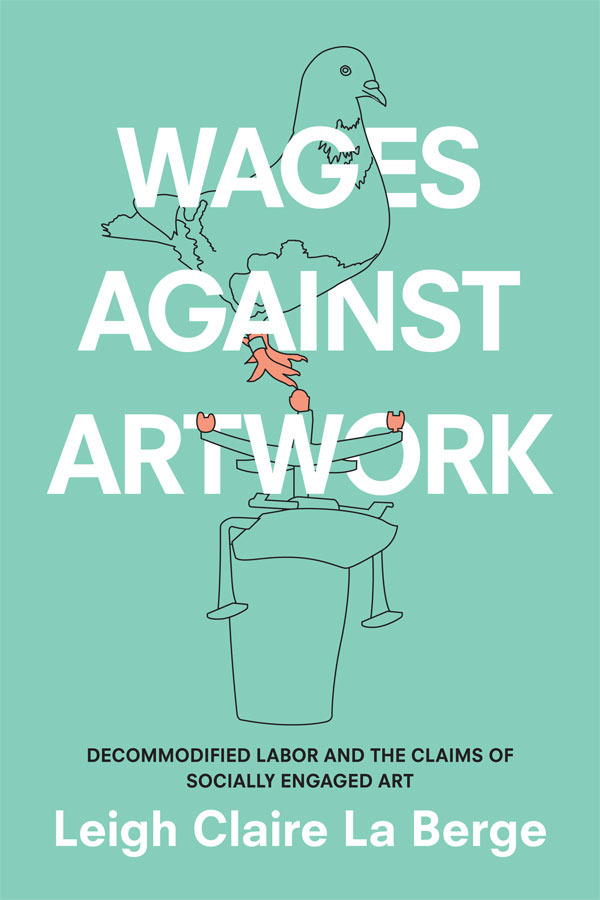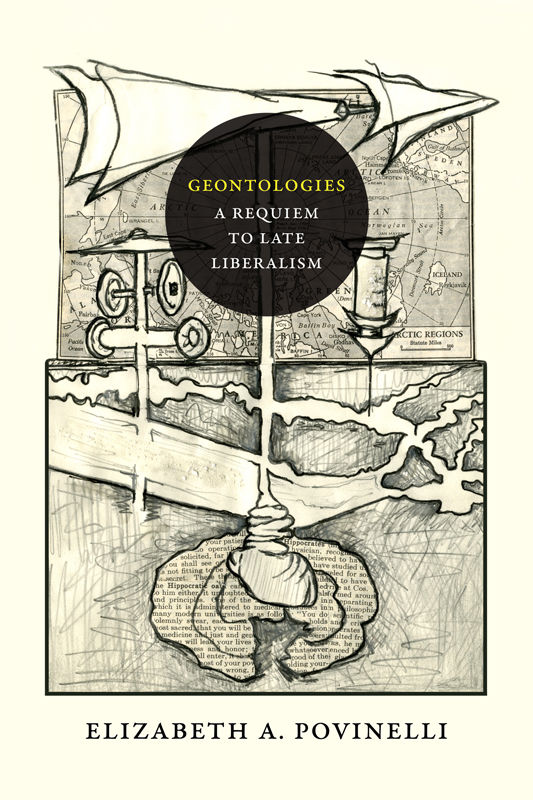Leigh Claire La Berge: Wages Against Artwork: Decommodified Labor and the Claims of Socially Engaged Art (2019)
Filed under book | Tags: · aesthetics, animal, art, capital, capitalism, children, commodity, debt, economics, labour, money, neoliberalism, socially engaged art, value, work

“The last twenty years have seen a rise in the production, circulation, and criticism of new forms of socially engaged art aimed at achieving social justice and economic equality. In Wages Against Artwork Leigh Claire La Berge shows how socially engaged art responds to and critiques what she calls decommodified labor—the slow diminishment of wages alongside an increase in the demands of work. Outlining the ways in which socially engaged artists relate to work, labor, and wages, La Berge examines how artists and organizers create institutions to address their own and others’ financial precarity; why the increasing role of animals and children in contemporary art points to the turn away from paid labor; and how the expansion of MFA programs and student debt helps create the conditions for decommodified labor. In showing how socially engaged art operates within and against the need to be paid for work, La Berge offers a new theorization of the relationship between art and contemporary capitalism.”
Publisher Duke University Press, Durham, NC, August 2019
ISBN 1478004231, 9781478004233
xiii+261 pages
Reviews: Noni Brynjolson (Field J), Lee Painter-Kim (Women’s Studies), Amber Taylor (E3W).
Interviews with author: Andreas Petrossiants (e-flux, 2018, podcast), Wen Zhuang (LA Review of Books, 2020), Andreas Petrossiants (Brooklyn Rail, 2020), Pierre d’Alancaisez (New Books Network, 2021, podcast).
PDF (11 MB)
Internet Archive (multiple formats)
Elizabeth A. Povinelli: Geontologies: A Requiem to Late Liberalism (2016)
Filed under book | Tags: · anthropocene, assemblage, being, biopolitics, capital, difference, ethnology, geology, geontopower, governance, indigenous peoples, liberalism, life, ontology, power

“In Geontologies Elizabeth A. Povinelli continues her project of mapping the current conditions of late liberalism by offering a bold retheorization of power. Finding Foucauldian biopolitics unable to adequately reveal contemporary mechanisms of power and governance, Povinelli describes a mode of power she calls geontopower, which operates through the regulation of the distinction between Life and Nonlife and the figures of the Desert, the Animist, and the Virus. Geontologies examines this formation of power from the perspective of Indigenous Australian maneuvers against the settler state. And it probes how our contemporary critical languages—anthropogenic climate change, plasticity, new materialism, antinormativity—often unwittingly transform their struggles against geontopower into a deeper entwinement within it. A woman who became a river, a snakelike entity who spawns the fog, plesiosaurus fossils and vast networks of rock weirs: in asking how these different forms of existence refuse incorporation into the vocabularies of Western theory Povinelli provides a revelatory new way to understand a form of power long self-evident in certain regimes of settler late liberalism but now becoming visible much further beyond.”
Publisher Duke University Press, 2016
ISBN 9780822362111, 0822362112
xii+218 pages
Interview with author: Mathew Coleman and Kathryn Yusoff (Theory, Culture & Society, 2017).
Reviews: Shela Sheikh (Avery Review, 2017), Robin Wright (Society+Space, 2017), Eve Vincent (Australian Aboriginal Studies, 2017), Timothy Neale (Australian Journal of Anthropology, 2017), Andrea Muehlebach (Anthropological Quarterly, 2018), Jean-Thomas Tremblay (Critical Inquiry, 2018), Elizabeth R Johnson, Garnet Kindervater, Zoe Todd, Kathryn Yusoff, Keith Woodward (with author’s response, EPC: Politics and Space, 2019).
Comment (0)Museum Highlights: The Writings of Andrea Fraser (2005)
Filed under book | Tags: · aesthetics, appropriation, art, art criticism, autonomy, capital, collecting, conceptual art, curating, institutional critique, museum, performance, performance art

“Andrea Fraser’s work, writes Pierre Bourdieu in his foreword to Museum Highlights, is able to ‘trigger a social mechanism, a sort of machine infernale whose operation causes the hidden truth of social reality to reveal itself.’ It often does this by incorporating and inhabiting the social role it sets out to critique—as in a performance piece in which she leads a tour as a museum docent and describes the men’s room in the same elevated language that she uses to describe seventeenth-century Dutch paintings. Influenced by the interdisciplinarity of postmodernism, Fraser’s interventionist art draws on four primary artistic and intellectual frameworks—institutional critique, with its site-specific examination of cultural context; performance; feminism, with its investigation of identity formation; and Bourdieu’s reflexive sociology. Fraser’s writings form an integral part of her artistic practice, and this collection of texts written between 1985 and 2003—including the performance script for the docent’s tour that gives the book its title—both documents and represents her work.
The writings in Museum Highlights are arranged to reflect different aspects of Fraser’s artistic practice. They include essays that trace the development of critical ‘artistic practice’ as cultural resistance; performance scripts that explore art institutions and the public sphere; and texts that explore the ambivalent relationship of art to the economic and political interests of its time. The final piece, ‘Isn’t This a Wonderful Place? (A Tour of a Tour of the Guggenheim Bilbao),’ reflects on the role of museums in an era of globalization. Among the book’s 30 illustrations are stills from performance pieces, some never before published.”
Edited by Alexander Alberro
Publisher MIT Press, 2005
ISBN 0262062445, 9780262062442
xxxvii+291 pages
Reviews: Kirsi Peltomaki (Afterimage, 2005), Melissa Gronlund (Frieze, 2005), Louis Byrne (Art Book, 2007), N.A. Hayes (PopMatters, 2008).
PDF (104 MB, no OCR)
Comment (0)
